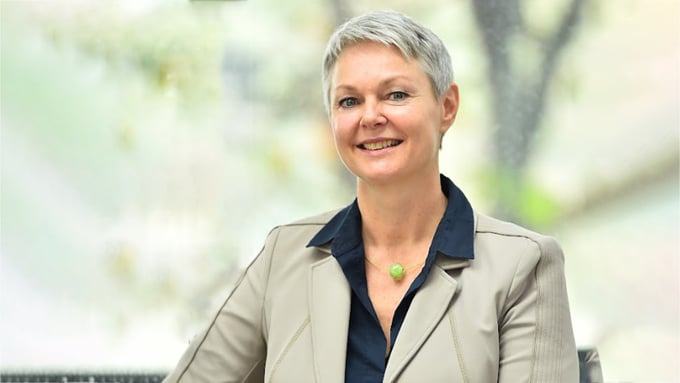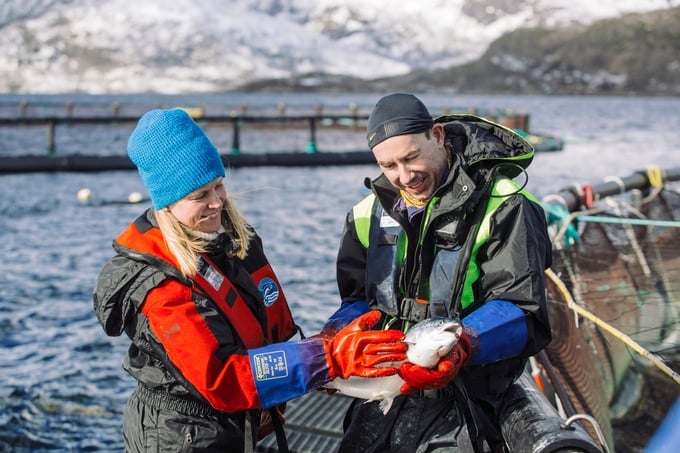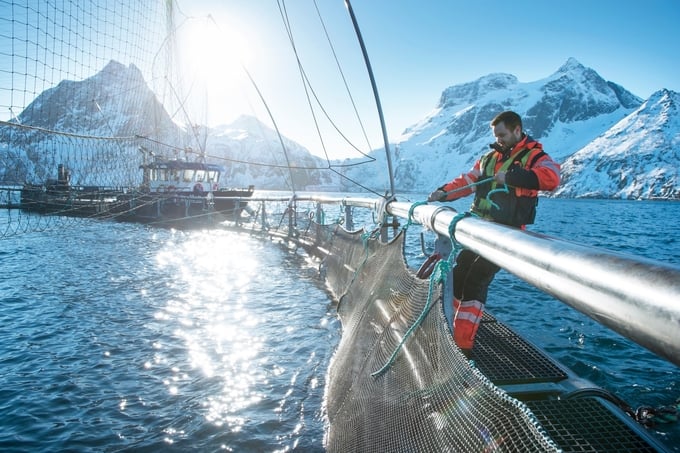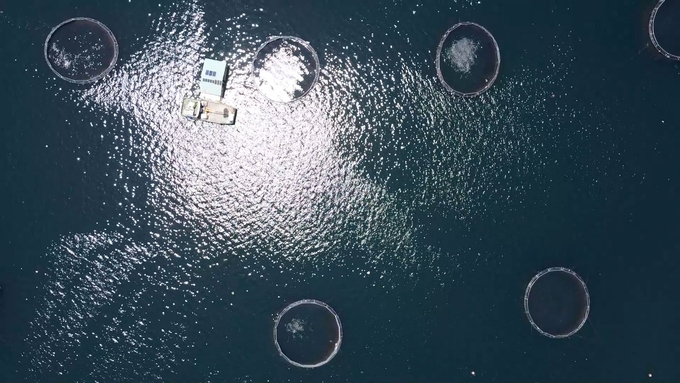June 17, 2025 | 21:05 GMT +7
June 17, 2025 | 21:05 GMT +7
Hotline: 0913.378.918
June 17, 2025 | 21:05 GMT +7
Hotline: 0913.378.918
That is a solution for Vietnam to develop a sustainable marine farming industry, as suggested by Norwegian Ambassador to Vietnam, Ms Hilde Solbakken. In her interview to Vietnam Agriculture Newspaper, Ambassador Solbakken also "revealed" some secrets that made Norway’s marine farming industry well-known globally.

Norwegian Ambassador to Vietnam Hilde Solbakken said: "Vietnam is going the right way towards the development of sustainable marine aquaculture". Photo: HT.
Dear Ambassador, how do you see the potential of, and challenges to, Vietnam’s marine farming now?
Vietnam is going the right way towards the development of sustainable marine aquaculture. In 2021, Prime Minister Pham Minh Chinh approved the Fisheries Development Strategy to 2030, with a vision to 2045, followed by Project 1664 on the development of marine aquaculture to 2030, with vision to 2045. Project 1664 aims to reduce the intensity of ocean resources exploitation and to develop marine aquaculture in appropriate areas. The strategy also sets the direction for offshore marine fish farming development, to promote technology-led fish farming on industrial scale. As the world’s third largest seafood exporter, it is commendable that Vietnam is targetting to increase the seafood export by USD 14 and 16 billion by 2030 and 2045 respectively.
In this context, marine faming becomes inevitable. While the world's population and the need for food is steadily increasing, marine farming helps to meet the rising demand for seafood without putting additional pressure on wild fish stocks. Marine farming contributes to striking a balance between use and protection of sea resources and building a sustainable fisheries industry.
Vietnam holds significant potential for marine farming. Over 3,200 kilometers of coastline provide ample opportunities for marine farming activities. With diverse marine ecosystems and biodiversity, Vietnam's waters provide a wide array of options for aquaculture production: Fish, shrimp, shellfish and seaweed.

Norwegian aquaculture particularly salmon farming is possibly the world’s greatest success story in sustainable marine fish farming. Photo: NSC.
“Achieving a high-quality, commercially successful and sustainable aquaculture industry is not a one-time thing. As we also see in Norway, the industry, government and research need to work together to continuously update best practices in the face of new challenges, such as the effects of climate change”, Norwegian Ambassador to Vietnam Hilde Solbakken said.
The Government has recognised the importance of sustainable aquaculture in ensuring food security, creating jobs, and boosting economic growth. Therefore, there have been numerous policies and initiatives in place to support the development of the aquaculture industry, including infrastructure investment, research and development programs, regulatory frameworks, which now more focus on training high-skilled workforce and application of modern technologies and sustainable practices.
However, Vietnamese marine farms are still of small-scale and very close to the shore-line with high density. These farms are encountering the same challenges we saw during the early stages of fish-farming in Norway. Itcausesmarine environmental pollution particularly, and can sometimes conflict with other economic activities near the shore, including tourism.. Productivity remains modest due to lack of clear regulations on technical standards, biosecurity assurance, high risk of disease spread, and common practice of antibiotics usage for disease treatment.
It will require concerted efforts from government and private investors to develop the necessary regulatory frameworks, train skilled workers and implement best practices for sound marine aquaculture, which in turn will improve productivity and sustainability of aquaculture practices.
Norway is seen as a "model" of marine farming on industrial scale, particularly for salmons. Can you highlight some key factors that decide Norway’s success in this industry?
When I tell people in Vietnam that I am from Norway, many immediately say “Cá hồi Na Uy". Indeed, Norwegian salmon has become Norway’s iconic symbol in Vietnam and over the globe. It is not only tasty, nutritious and healthy, but also antibiotic-free and non-GMO.
Norwegian aquaculture particularly salmon farming is possibly the world’s greatest success story in sustainable marine fish farming. Industrial farming of salmong in Norway really got under way in the 1970s. Since then, Norway has been the first country to successfully farm and then commercialize Atlantic salmons.
Our success story of salmons can be attributed to some key factors. Norwegian natural conditions with pristine fjords and cold waters makes Norwegian salmon distinctive with exceptional quality and freshness. In addition, we strongly focus on sustainable practices in salmon farming. The industry adheres to stringent regulations regarding stocking densities, feed composition, waste management, and antibiotic usage.
We take measures to control various stages of the supply chain from hatcheries and smolt production to grow-out farms and processing facilities. This allows for greater quality control, traceability, efficiency and the lowest possible impact on the environment. In this regard, technological solutions are key.
Another key factor is the strong collaboration between government, industry and academia, driving towards more sustainable fish farming practices. Since salmon is Norway’s second largest export, the government and the industry work together to fund training programmes and internships. Also, many aquaculture-specific research facilities and institutions collaborate with farms and industry. The continuous monitoring and research carried out by environmental authorities and academia, provides essential information to the government and industry on how to ensure sustainable and productive salmon farming. They work together for a shared vision for the future.
Achieving a high-quality, commercially successful and sustainable aquaculture industry is not a one-time thing. As we also see in Norway, the industry, government and research need to work together to continuously update best practices in the face of new challenges, such as the effects of climate change.
What of Norway’s lessons, do you think, can be useful for Vietnam?
Build an enabling regulatory framework, including a good marine spatial planning. Norway has adopted a very effective integrated approach to ocean management, which identifies clearly which sea areas should be allocated for aquaculture, tourism, oil and gas, maritime and renewable energy activities including offshore wind. This would ensure that all marine industries can grow in harmony and benefit from ocean resources.
Focus on sustainability from the start, whether environmental conditions to determine location, or best practices for fish health.
Invest in research and Innovation for advancing modern and sustainable aquaculture technologies, improving production efficiency, and addressing industry challenges.
Improve collaboration and knowledge sharing among industry stakeholders, including producers, researchers, and government agencies.

Norway has adopted a very effective integrated approach to ocean management, which identifies clearly which sea areas should be allocated for aquaculture, tourism, oil and gas, maritime and renewable energy activities including offshore wind. Photo: NSC.
Develop a strong brand such as "Seafood from Norway” and effective market positioning strategies. This is what we have been doing with all the seafood products from Norway. In 2023, Norway exported 1.2 million tonnes of salmon to a value of NOK 122.5bn, which is 71% of the total value of all Norwegian seafood exports. This corresponds to 22 million meals of Norwegian salmon every single day.
What solutions do you think Vietnam should take to be come a global STAR in marine farming? And do you think this is feasible for Vietnam?
For marine faming to grow successfully on industrial scale, it requires a proper strategy, careful planning, good understanding of marine ecosystems and advanced aquaculture practices, and adherence to environmental regulations.
With the strategy already adopted, Vietnam is now in the early stage of the industry development. Therefore, it is timely and crucial to have in place a long term and comprehensive marine spatial planning. Considering factors such as water quality, temperature, currents, depth, accessibility, and proximity to markets, and taking into account the need to develop other marine industries with the least impact on oceans resources will be important premises for the offshore marine farming grow sustainably.
Vietnam already has some key seafood products for export such as shrimp, pangasius and tuna. For industrial marine aquaculture there are promising results for barramundi (Asian Seabass). For the competitiveness, it is important to increase the value and quality of export products where sustanability is the key factor.
It is possible to start with some pilot projects where only one or two species are selected based on a thorough research of the market trend taking into account the local environment. Then, sustainable practices will be applied through out the production chain, considering factors such as breed quality, growth rate, feed conversion ratio, disease resistance, ecological impact, harvest, transportation and processing. These pilot projects will help provide many lessons for either improvement or multiplication.
Small steps lead to great success. With significant potential and strong political will, I believe Vietnam can realise what it aims for.
What can you say about Norway-Vietnam cooperation in the marine farming in the time to come, Ambassador?
Over four decades of Norway-Vietnam cooperation in the fisheries have laid a strong foundation for us to continue the cooperation in marine farming industry.
We are now implementing the Letter of Intent of Cooperation signed between the Ministry of Agriculture and Rural Development of Vietnam and the Ministry of Trade, Industry and Fisheries of Norway in 2021 on strengthening and developing cooperation in marine aquaculture industry.

With the strategy already adopted, Vietnam is now in the early stage of the industry development. Therefore, it is timely and crucial to have in place a long term and comprehensive marine spatial planning. Photo: Duy Học.
As Vietnam is working on its national marine spatial planning (MSP), Norway, together with UNDP Vietnam, is assisting the Government of Vietnam by sharing our good experience in development and application of MSP with Vietnam.
To achieve the high-income aspiration by 2045 and net zero commitment by 2050, Vietnam needs to shift its growth model, essentially through a smooth energy transition process as well as unlocking its blue economy potentials. Vietnam therefore needs to build its capacity in science-based, sustainable ocean management, in which MSP is essential.
Norway and Vietnam share interest in developing aquaculture in a sustainable and just manner amid rising global challenges including climate change. Innovation and technology play a key part for it to succeed, and open new opportunities for our companies to work with each other.
With their advanced technological solutions, financial mechanism, connections and established expertise spanning the entire production chain of the aquaculture industry, many Norwegian companies have been making great contribution to Vietnam’s aquaculture and seafood processing industries, some can be named Scale AQ, Skreting, Pharmaq, Selstad, GenoMar, TerraMarine, MMC First Process... I am sure many more will come and stay.
Thank you very much Ambassador!
Norwegian Ambassador to Vietnam Hilde Solbakken said: “With the strategy already adopted, Vietnam is now in the early stage of the industry development. Therefore, it is timely and crucial to have in place a long term and comprehensive marine spatial planning”.
Translated by Hong Tham
![Turning wind and rain into action: [6] ‘Four on-the-spot’ disaster management software](https://t.ex-cdn.com/nongnghiepmoitruong.vn/608w/files/news/2025/06/17/e5a48259d6a262fc3bb3-nongnghiep-183800.jpg)
(VAN) By simply activating the scenario on the disaster management software, the relevant authorities immediately know how many households need to be evacuated, where to evacuate them to, and by what means of transportation…

(VAN) According to the Binh Thuan Department of Industry and Trade, in the first five months of 2025, Binh Thuan's dragon fruit export turnover increased by 20.65% compared to the same period last year.

(VAN) EU countries on Thursday gave final approval to new tariffs on fertilizer imports from Russia, a move aimed at cutting off revenue that could support Moscow’s war in Ukraine, despite concerns from European farmers.

(VAN) The working delegation from the Ministry of Agriculture and Environment conducted an important trip to the Netherlands to strengthen strategic partnerships and sustainable development in the agricultural sector.

(VAN) The letter ‘A Plea from the Ocean’ not only evokes emotion but also awakens the human conscience to the responsibility of protecting life on Earth.

(VAN) The Department of Agriculture in South Africa has announced the country’s first mass vaccination of poultry to prevent local birds from contracting avian influenza.

(VAN) Establishment of the Mekong Delta Regional Agricultural Linkage Center, aiming for a closed value chain, deep processing, trading platforms, and international market connectivity.